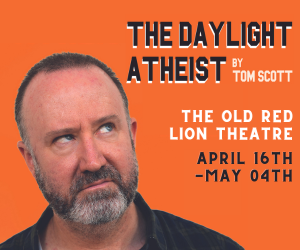As a
playwright, David Edgar long ago sped past the number of plays written by
Shakespeare, but it’s fair to say that – while often making a big impact at the
time – not many of his works have since entered the national repertory. This
production of his 1979 play
The titular character is, of course, Mary Barnes; a middle-aged nurse who, for six years during the 1960s, moved into Kingsley Hall, a controversial residence/therapy facility in London where people were encouraged to work through their mental illness
The titular character is, of course, Mary Barnes; a middle-aged nurse who, for six years during the 1960s, moved into Kingsley Hall, a controversial residence/therapy facility in London where people were encouraged to work through their mental illness – in Mary’s case, schizophrenia – within a non-restraining, non-drug based environment, living alongside other patients and their therapists. Despite repeated references to this “community”, however – and the numerous opportunities to see the cast sitting around table for supper – the focus of this play is undoubtedly on Mary Barnes, and her journey from madness to creative artist. This somewhat reduces nigh on all the rest of the characters – arguably with the exception of her favourite therapist Eddie – to little more than bit parts, satellites orbiting and often eclipsed by the main centre of dramatic gravity.
This aspect of the script is emphasised most obviously here by Caitlin McLean’s physically and emotionally fearless performance as Mary, which in turn is enhanced by director Daniel Omnes repeatedly ensuring that she’s nearly always the focus of our attention in terms of staging, framing and lighting. The nearest to her in importance is Rufus Love as Eddie, who manages to imbue his seemingly glass-half-full character with greater depths than his initial late-night entrance on stage suggests.
The rest of the ensemble cast make the best of what they’re given in the circumstances – especially Verity Brown as the somewhat world-weary Kelly, Harry Whitehead as the “wired” Zimmerman, and Martha Myers as fellow mental health survivor Angie frankly an overt example of Edgar’s tendency here to “tell not show”). For the rest of the cast, alas, they generally fail to breathe full life into the light character sketches they’ve been given, in some cases appearing and vanishing after a few minutes, while leaving barely a trace.
The multilevel staging used here is useful in delineating the characters, but the setting also distracts in its cluttered, all-too-literal representation of the suggested need to demolish something before rebuilding. This literalness also features in a video montage of wars and political protests that is used, primarily, to show the passage of the years – even though it’s difficult to connect any of those events to the seemingly insular lives of those living in Kingsley Hall, especially Mary.
While there are moments of genuinely memorable theatre in this production, unfortunately they are few and far between; there’s also a slightly ponderous, all-too-earnest feel to the whole production which, unfortunately, means that you’re all-too-aware of every minute of its two-and-a-half hours running time.









